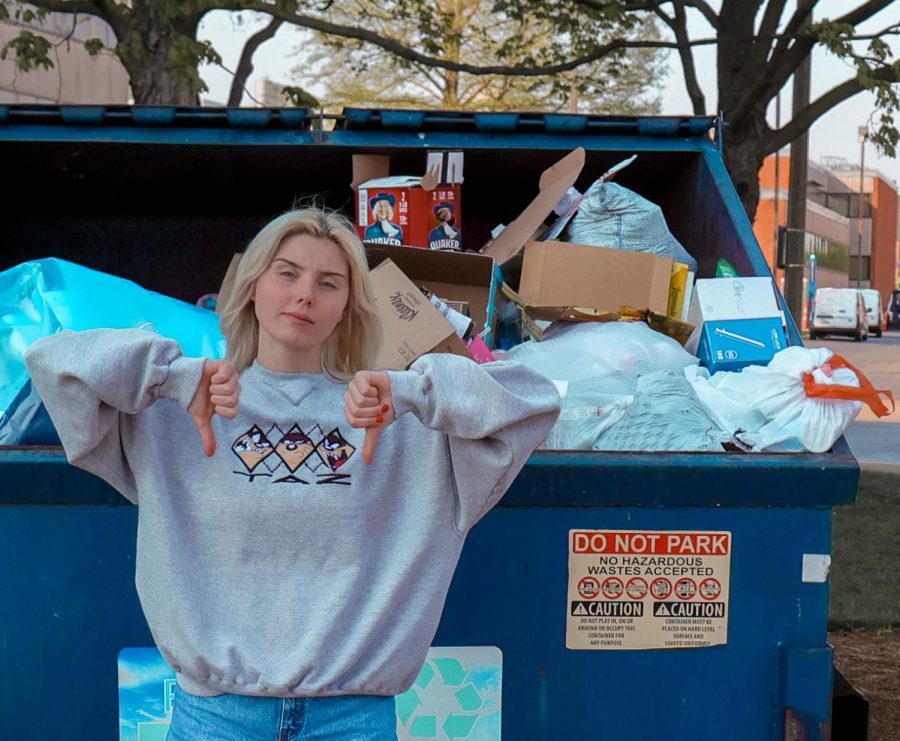How to recycle properly
American society runs on speed and convenience, which has created an excellent market for single-use products that are often derived from plastic, paper, cardboard or aluminum materials. Despite the practicality of these items, they, unfortunately, have catastrophic effects on our health and environment. Americans make more than 200 million tons of garbage each year, which is enough to fill Busch Stadium from top to bottom twice a day. The good news is that most of our waste is recyclable. The bad news? The Environmental Protection Agency, EPA, estimates that despite 75 percent of the American waste stream being recyclable, only about 30 percent is recycled.
The most concerning aspect is the general public’s lack of knowledge on how to recycle appropriately. Most Americans are only given a brief assembly during their elementary school years about the three “R’s,” reduce, reuse and recycle, told to put any and all plastic in paper in the blue bins and are sent on their way. The topic is not revisited again, yet sets an inappropriate standard of how to dispose of waste correctly. Even at SLU, despite the embraced practice of single-stream recycling, people are still not recycling correctly. With these things in mind, here are some simple strategies and tips to remember when recycling. One small change in your daily habits can create a huge difference for the world. Always remember that one person alone cannot create a difference, but a million people doing the same thing can. Be a part of the million.
**All information is Taken from Saint Louis City Recycles
- General Do’s and Don’ts.
One of the most important things to remember is to always throw recycling in loosely. It should never be in any sort of contained environment, especially in plastic trash bags, which is something many SLU students do. To help store recyclables before disposal, a reusable plastic bag can come in very handy. When the time comes around to eliminate the debris, simply approach the nearest recycling bin, empty the bag of its contents and keep reusing it as needed.
Make an effort to never recycle the following items: aerosol cans, styrofoam, potato chip bags, plastic bags, disposable cutlery such as utensils, plates or napkins, even if they are biodegradable, plastic juice pouches such as Capri Suns, coffee cups, both paper and styrofoam, rigid plastics such as coat hangers and plastic chairs, ice cream cartons, ceramic plates, glasses or cookware.
- Plastic and Glass
According to Saint Louis City Recycles, plastic bottles, jugs and tubs are fully recyclable as long as they are cleaned on the inside and disposed of correctly. If the object contained food or liquid, the container must be thoroughly rinsed out before disposal. Labels are okay to leave on. Glass jars and bottles follow the same precinct: both are fully recyclable as long as they are cleaned on the inside and disposed of correctly.
- Paper
Note paper, office paper and notebook paper are safe to recycle. Newspapers, magazines and catalogs are recyclable as long as they are not stored in a plastic sleeve. Mail is also fully recyclable, even if it contains the plastic window. Paper lunch bags are recyclable as long as they do not contain food or other debris on the inside. Shredded paper must be stored in a paper bag, stapled and labeled. Gift wrap can be recycled as long as it does not have glitter or plastic covering on it. Phone books and paper books are safe to recycle. And lastly, hardcover books are only recyclable if the pages are separated from the cover.
- Cardboard and Aluminum.
Boxes must be flattened before recycling. Cereal boxes, cardboard tubes and cardboard beverage carriers are safe to recycle. Pizza boxes are recyclable as long as the grease stain is not bigger than the palm of one’s hand. Food cartons can only be recycled if they came from the refrigerated section, as cartons from the freezer must be disposed of in the trash. Aluminum cans and bottles are fully recyclable even with their labels on. Aluminum foil, pie plates and trays are recyclable as long as they are clean.
Your donation will support the student journalists of Saint Louis University.




